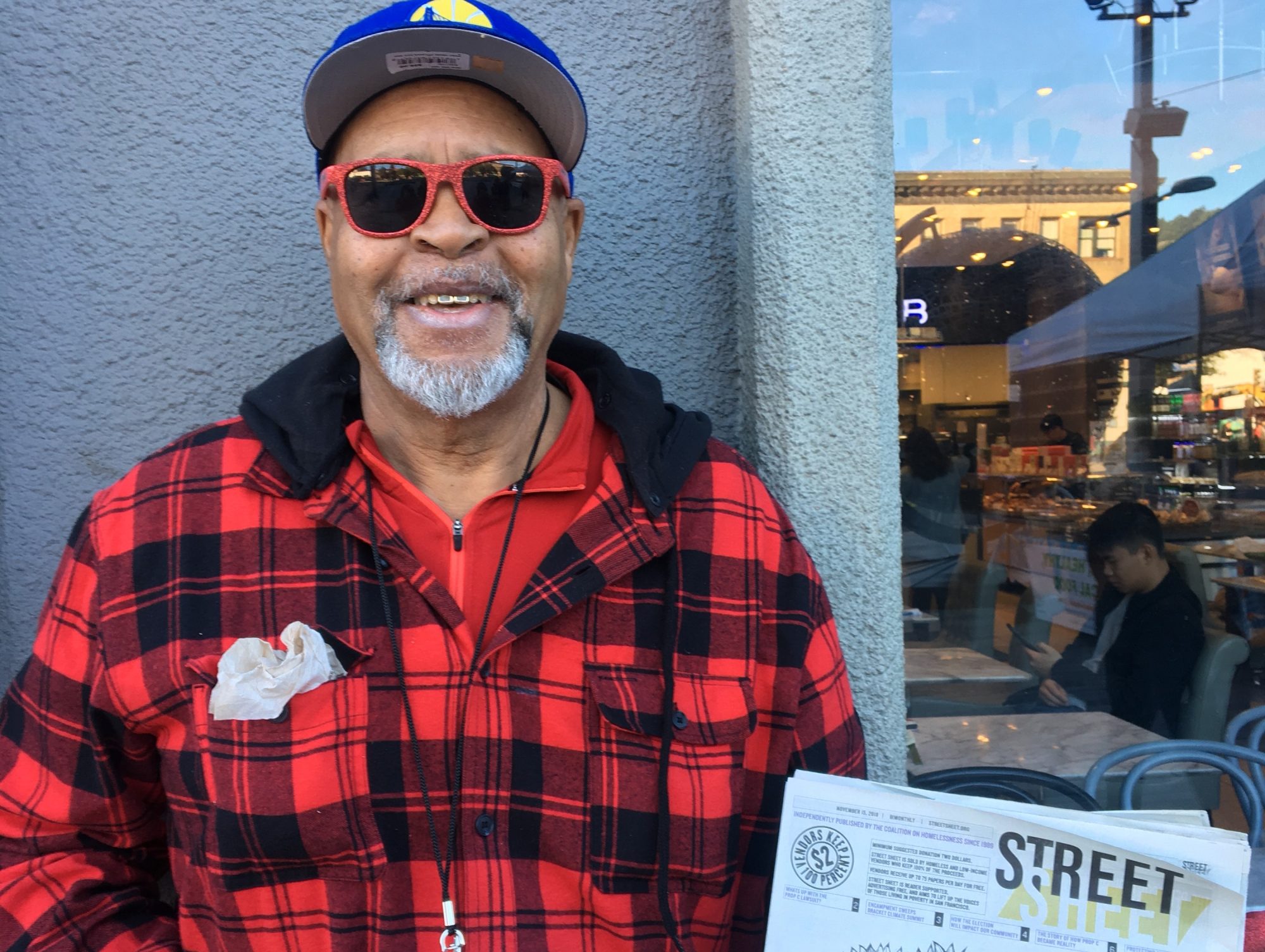Marion Morris, also known as “Red,” sells Street Sheet in Downtown Berkeley, just outside the BART station. He is 69 and lives in Berkeley, and he wears bright red sunglasses and a red plaid shirt, which is how he picked up his unique nickname. “People call me Red. I wear red most of the time,” Morris told me.
Morris started selling Street Sheet—San Francisco’s homelessness advocacy newspaper—several years ago when he worked across the bay. He says that even though he is retired, he still sells the paper because he loves the messages it conveys. “You can put out what’s happening…people who have actually lived this life,” he said. “I love the paper, and talking to the people about my testimony.”
Morris was born and raised in Waco, Texas. He describes his childhood as fun and eventful. “ I was in the Boys Club when I was seven years old. Very fun and I learned everything.” He did lots of sports at the Boys & Girls Club, such as swimming, basketball, and hockey. He also went to many rodeos, which he says were a popular pastime in his hometown.
In 1971, he moved to East Oakland. He lived on 23rd Avenue by San Antonio Park, where he got caught up in the city’s crack epidemic. “I had a long road of drugs and alcohol. Those were real, real struggles,” he said.
In the throes of his addiction, Morris lived on the street for five years. He was in East Oakland for a total of 17 years before he moved to San Francisco and started working at ToolWorks, a non-profit organization that helps homeless people find rehabilitation and get work. Morris had a number of jobs in San Francisco. He describes working at the Orpheum Theater, back in 1995. “I seen every Broadway play, working for the theatre,” he said, such as Tap Dogs, The King and I, Show Boat, and many others.
In 2003, Morris was attending Laney College and studying electronics and nutrition when he met his wife. Now, they have been married for seven years. They live together in an apartment in Downtown Berkeley.
Morris loves Berkeley. “You can protest and walk around Berkeley and say how you feel.” He knows many people in Berkeley and still sees them to this day, and communicates with them. In Berkeley, he feels you can wear what you want to wear and say what you want to say.
There is no place like Berkeley in the whole United States. It’s awesome. And people are so nice here. They will help you if you want to help yourself.”
—
A typical day for Morris starts with waking up at 5 a.m., going to the gym, and doing a little work out at City Sports. Then, he comes out and starts selling papers. He says he typically begins selling around 8 am. He ends his day by eating with his wife at their apartment.
Morris is also a dedicated member of his church, which he has been attending for the past two years. “I go every Sunday,” he said. He has been going there for the past two years. His favorite movie is a Christian Program called Jimmy Swaggart.
Though he is retired, Morris has strong dreams and aspirations for the future—both for himself and for the country. As someone who was homeless for five years, he hopes to open up a printing press where he can help share stories of homeless people on the streets.
He also strongly hopes that the people in the South, by the border, will be let into this country. He says, “they should be allowed in this country. The ones coming in the right way. We don’t need the ones with drugs or in gangs but I support them down there.”
He feels passionately about helping others in bad situations, and tries to give as much as he can. “I try to be a role model,” he says, describing his relationships with old friends who are still living on the street. “I say, ‘get you some papers. You don’t have to hold a sign.’”
Street Spirits is a monthly column, first published at Street Spirit, in which someone who lives on the street tells their story.
Sylvia Sawislak






